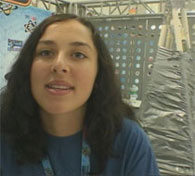2009-10-14
This is the VOA Special English Education Report.
The American biotechnology industry recently did a study of bioscience education across the country. The biosciences are biology and other sciences that deal with living organisms.
Paul Hanle is president of the Biotechnology Institute, one of the groups that did the study. He says international tests show that the United States is performing twenty-fifth out of thirty developed countries in science education.
 |
But the report said a number of the fifty states perform much better than others. Eight were rated as leaders: Connecticut, Massachusetts, Minnesota, New Hampshire, New Jersey, Ohio, Vermont and Wisconsin.
Paul Hanle says increasing the numbers of bioscience graduates could help the economy grow. He says there are many high-paying jobs in the biosciences. And some lower-paying jobs require only two years of college, or even a technical education program in high school.
Now here is a way to get students excited -- or more excited -- about science. Offer them fifty thousand dollars in savings bonds and the ceremonial title of "America's Top Young Scientist."
Ten children ages eight to fourteen were in New York recently for the finals of this year's Discovery/3M Young Scientist Challenge. Middle school students from every state entered the competition, sending in videotaped ideas. Officials said the five hundred students who entered were judged as much on their communication skills as for the scientific talent they showed.
 |
| Top winner Marina Dimitrov, with duct-taped structure |
All three eggs fell or broke. But all the structures remained standing -- thanks in large part to the large amounts of duct tape used by the students.
In the end, Nico Seamons and Nikita Gaurev shared second place. Marina Dimitrov won the top prize.
MARINA DIMITROV: "I just think it's really important to get kids excited about science at an early age, because they might be the next Albert Einstein or Isaac Newton, or America's top young scientist. It's just that I want to show that ordinary kids can do extraordinary things."
And that's the VOA Special English Education Report. You can find our reports with transcripts and podcasts -- and share comments -- at 21voa.com. You can also follow us on Twitter and YouTube. I'm Jim Tedder.